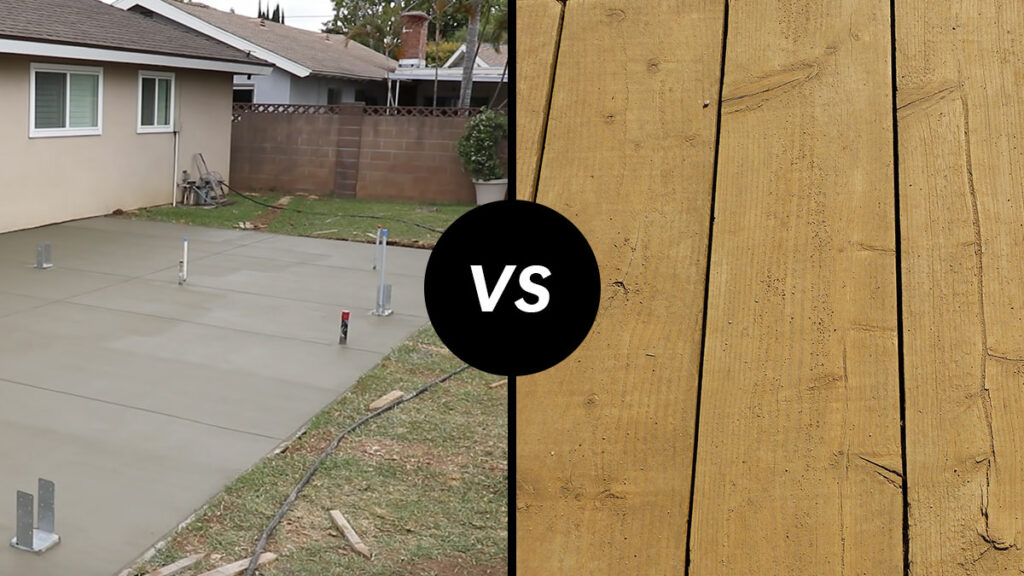Outdoor living space is now more crucial than ever, let’s face it. People are starting to understand how unhealthy and unproductive it is to sit inside on your sofa, scroll through social media, and binge watch streaming shows. Being outside is lovely because of the clean air, the trees, and the chirping birds, and numerous studies have demonstrated how healthful it is to spend time outside. There has never been a better time to get your backyard ready so that you and your family will want to hang out there than right now. Either a deck or a concrete patio serves as the cornerstone of any outstanding backyard. Perhaps you’d like a patio or deck but don’t know which to pick because you don’t have one. Let’s examine which of the decks and patios could be best for you and your way of life. Like practically everything, there are advantages and disadvantages to each.
The Good and the Bad of Wood Decks
Although wood decks have been around for a very long time, they weren’t commonly used for amusement until the 1970s. They were also plain, small rectangular places. By the 1980s, decks started to undergo significant alteration. Homeowners wanted their outdoor areas to be uniquely designed because they were no longer merely places where dad grilled hamburgers. Decks overnight changed from being a cheap exterior addition to being an extension of the house.
Prices, aesthetics, and durability differ between wood and composite decking. A well-built deck will provide you with years of use and pleasure. The type of wood or material you intend to use for your deck is the first decision in the deck design process.
The first decks were composed of natural wood, which is still a common choice today. Wood is the typical material for decks. Natural wood is the real stuff; it is untreated, has a pleasant scent, and looks fantastic. You can select from a variety of wood varieties, each of which has unique characteristics and aesthetics. When installing wood decks, more choices are available, such as the kind of finish.
Because they are reasonably priced and last for many years, softwoods are a common choice among homeowners. Although pricey, hardwoods are another common option. Care and upkeep are necessary for both softwood and hardwood decks to stop rot, fading, and discoloration. In comparison to composite decks, wood decks require more maintenance, including staining and sealing every few years. Although trees must be cut down in order to produce wood decking, it is a resource that is both recyclable and renewable.
A composite deck is an option if you don’t want to commit to typical wood deck maintenance. The main advantage of a composite deck is its durability; you may use it for a very long period because composite materials can endure severe weather conditions for many years without preservation or repair. Additionally, composite decks are lightweight, stain-resistant, and non-rotting.
You should take into account the negative aspects of composite decking. Composite decks have several drawbacks, including a lack of mold and mildew resistance, certain slats that look cheap or phony, and a propensity to sag and flex more than wood. The non-renewable sources are also used to make composite slats.
Pros and Cons of Cement Patios
Over 2,000 years ago, the Greeks and Romans created cement by combining lime, water, and volcanic ash to create a solid substance. But it wasn’t until 1913 that modern concrete really took off, thanks to the establishment of Ready Mix, which started mixing concrete in one spot and distributing it to construction sites.
Since its creation in 1915, colored concrete has gained popularity. Since its invention in the 1950s, ornamental concrete has experienced tremendous increase in popularity, transforming what were once simple and plain patios into something aesthetically pleasing.
The price is one of a concrete patio’s main advantages. A cement patio typically has lower startup costs than a timber deck. However, timber decks often have a greater rate of return on investment, at around 75%. A cement patio will return some of your investment, but often only between 30 and 60%.
The stylistic diversity of cement patios gives them an additional edge over decks. Traditional decks are rather simple; they all have roughly the same design, and the colors of the stain and sealant are widely used. There are literally thousands of alternatives available when choosing a cement patio in terms of style and quality. To replicate tile, stone, and brick as well as geometric patterns, stamping patterns and other finishing techniques are used. Cement patios can also be stained with solid colors or even blended designs.
Similar to wood decks, cement patios will last longer with proper care and routine maintenance. Concrete decks don’t require resealing and restraint as frequently as its wooden equivalents do, though. Re-sealing a wood deck can cost anywhere between $500 and $1,000, while sealing a concrete patio might be between $100 and $200. Additionally, homeowners who have a wood deck need to inspect it annually for decay, mold, and loose boards.
Concrete patios are a great investment since they not only look great but also function well. With a concrete patio, you won’t experience problems like warping and splintering that you may with a wood or composite deck. Your concrete patio could crack at any time, though.
Concrete patios have a few other drawbacks as well. Concrete, for instance, is not very DIT friendly, and repairs can be challenging if you don’t know what you’re doing. When it freezes and thaws repeatedly, as it does here in North Carolina, concrete patios can become damaged.
To find out which is ideal for you and your property, we advise you to do a little study. Give us a call if you’d like an unvarnished assessment of the situation. We aren’t here to push products on you that aren’t a good fit for you; rather, we want what will serve your requirements and applications the best, even if that means a wooden deck. If you believe a concrete patio is the best option for you, complete our estimation form, and we will contact you.

